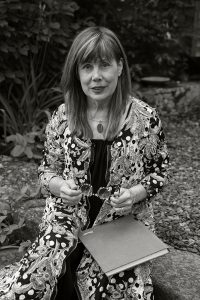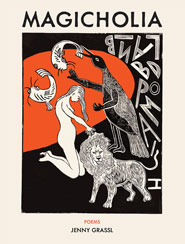Our Authors

Jenny Grassl
As chrysalis and catacomb, the poems of Magicholia open to illuminate the magical human mind, by way of mania and melancholia. Surreal images rise out of the unconscious, bringing moments of beauty in confusion or clarity. Magic is both illness and cure. In the opening poem, a woman and her dress are gone. The dress is the speaker. The book continues to tell stories about the separation of a woman from the world. The reader is the only intimate companion for her as she approaches extinction, and confronts her own death. A journey of identity winds through her struggle and treatment. Self and earth blur. The natural world is near in its splendor and frangibility. It allows the woman to emerge from her old body, recognizing vulnerability. Fairy tales are reimagined throughout, offering a magical/historical version of a woman’s life in the shadow of father-kings and wedded princes.
For centuries, creative practitioners have framed the poem as spell, as conjured miracle, as gift. Poetic voice, then, becomes an alterity that speaks through the writer, who is merely a vessel for an otherworldly message. For Homer, this alterity was the muse; for H.D., it was the unconscious mind; for Jack Spicer, it was radio waves from outer space; and for the late Lucie Brock-Broido, poetry was none other than a séance “peopled by wizards.” Jenny Grassl’s Magicholia adeptly situates a contemporary feminist aesthetics and ethics within this artistic lineage. She brilliantly deconstructs the artifacts of femininity–a dress, a slipper—while at the same time reframing them as objects of wonder, mystery, and danger. The otherness that speaks through Grassl’s poems is not only a source of feminine power, but also, a form of resistance. Magic abounds in the world she creates, a spark that cannot be controlled by traditional logic, or dimmed by those lingering vestiges of a predominantly male, predominantly Western artistic tradition. Jenny Grassl is a bright light in today’s literary landscape, and this is surpassing work. Brava!
—Kristina Marie Darling, Fulbright Scholar, Daylight Has Already Come: Selected Poems
In Jenny Grassl’s Magicholia, spells and figments fly, phrases and lines emerge like islands filled with strange vegetation, and we are transported to a landscape of language, wild and fresh, where a speaker will “…gather loose holes of migration…over kettles of burning land” or where “seas crash so many stairs” and “moon calves into black.” Extinction, a looming dread, haunts these poems, even as the language springs, as if by miracle, struck from a rock, renewed. This is pastoral dipped in fire and swelling with song, an immersive experience unlike in any poetry currently popular. This is Grassl’s world, unmistakable and riveting.
—Joan Houlihan, It Isn’t a Ghost if it Lives in Your Chest
In Jenny Grassl’s poem, “Spring Landings,” a woman contemplates leaping from a high-rise, noting, as she falls, the details of apartments and lives— dogs, houseplants, tenants’ sectional sofas. To read Magicholia is to plummet. Grassl writes the silk dress of womanhood, pours facets into cloth, brings her speaker to the brink of death, and pulls her back. Deploying associative images and white space on the page, each line is spell casting— “fall into the well/ really just a tear duct/ salt and undrinkable/ inked with all the words/ for trapped… .” These poems push boundaries of contemporary feminist literature and, with a similar unflinching gaze, Grassl is akin to Sexton. Magicholia reveals complexities of female identity but this time with views from a 21st-century tower. I invite you, jump.
—Robert Carr, The Heavy of Human Clouds
Jenny Grassl received her M.F.A. in poetry from Bennington Writing Seminars and her B.F.A. from Rhode Island School of Design where she majored in photography and also studied painting and drawing. Her work has published in many poetry journals including Boston Review, Tupelo Quarterly, Bennington Review, Lana Turner, and Ocean State Review.
As a visual artist she has created images with poetry and automatic writing in a variety of media including photography, collage, painting, printmaking, and sculpture. Presently she is focused on photography collage.
Jenny has exhibited widely, including at the Joyce Goldstein Gallery, Chatham, New York; Janapa Gallery, New York, New York; The Center for Book and Paper Arts, Chicago, Illinois; Atlantic Works Gallery, Boston, Massachusetts, The Gallery at Atlantic Wharf, Boston, Massachusetts, and Arsenal Center for the Arts, Watertown, Massachusetts.
In visual art, Automatic Writing and poetry create the text, offering a shorthand or personal hieroglyphic images. The art and poetry both come out of a love of language, speaking about human relationships and the realm of myth and magic, in a time of climate change and misogyny.

